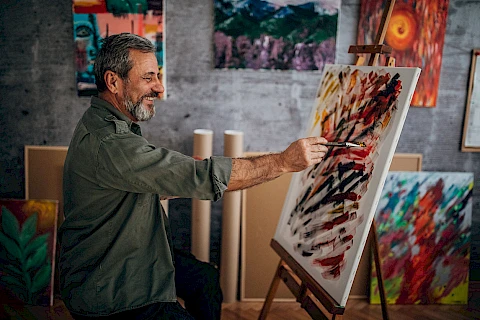
Alzheimer's disease is a challenging condition that profoundly affects individuals and their families. It can erode memory, awareness, and the ability to perform everyday activities. Amidst these challenges, art therapy emerges as a beacon of hope that allows for creative expression, connection, and opportunity. Introducing art therapy to a senior loved one with Alzheimer's brings light to their days.
Art Therapy
Art therapy uses creative processes to improve psychological and emotional well-being. It has a rich history, formally developed in the mid-20th century. For individuals with Alzheimer's, art therapy harnesses the brain's remaining abilities. Engaging in artistic activities can provide a way to express thoughts and feelings when words are hard to find.
Many forms of art therapy can be beneficial. Painting and drawing can help spark recognition and memory recall. Music can evoke emotions and past experiences, creating clarity and joy. Sculpture and crafting can engage the senses, bringing tactile pleasure and accomplishment.
Cognitive Benefits of Art for Alzheimer's Patients
Art therapy can stimulate brain activity. Engaging in creative tasks can encourage memory recall by tapping into familiar activities and experiences. When Alzheimer's patients paint or draw, they can often reconnect with memories, even for a fleeting moment.
Art also enhances communication. Nonverbal expression through art offers Alzheimer's patients an alternative method of conveying thoughts and feelings, promoting understanding among caregivers and family members.
Improved focus and attention are also notable benefits. The immersive nature of art requires concentration, which can help individuals stay engaged and mentally active for extended periods.
Emotional and Social Benefits of Art Therapy
Creative expression can significantly reduce symptoms of anxiety and depression. When individuals focus on creating, they can experience reduced levels of stress and a greater sense of calm.
Art also provides a sense of accomplishment and boosts self-esteem. Completing an art project, no matter how simple, can instill pride and joy.
Moreover, art offers opportunities for social interaction. Group art projects or classes can foster a sense of community, which is needed to nurture connections and combat feelings of isolation.
Getting Started with Art Projects at Home
Art therapy can be highly beneficial in a therapy-based setting. However, you can also enjoy many of those benefits at home. Choosing the right art activities is a must. Consider the stage of Alzheimer's and select projects that are both enjoyable and achievable. Early-stage individuals might enjoy more complex activities like painting or music-making. Simpler tasks like coloring or listening to music might be more suitable in later stages.
Some simple art projects to try at home include:
- Painting with watercolor or acrylics
- Creating a collage with magazine cutouts
- Listening to and singing along with favorite songs
- Crafting clay sculptures or simple beading
Creating a supportive environment is also key. Ensure the space is well-lit, comfortable, and free from distractions to enhance focus and enjoyment.
Get Help with Alzheimer's and Dementia Care
At Senior Helpers Johnson County, we are committed to providing exceptional care services for individuals with Alzheimer's in the Overland Park, Olathe, Leawood, Shawnee, and Prairie Village areas. We understand the profound impact of Alzheimer's on the families we serve and are here to help with care services tailored to their unique needs.
Our dedicated team can help incorporate art therapy into personalized care plans. Integrating creative activities helps improve the quality of life for those with Alzheimer's. Contact Senior Helpers Johnson County today for assistance and to explore how art therapy can be part of your loved one's care.